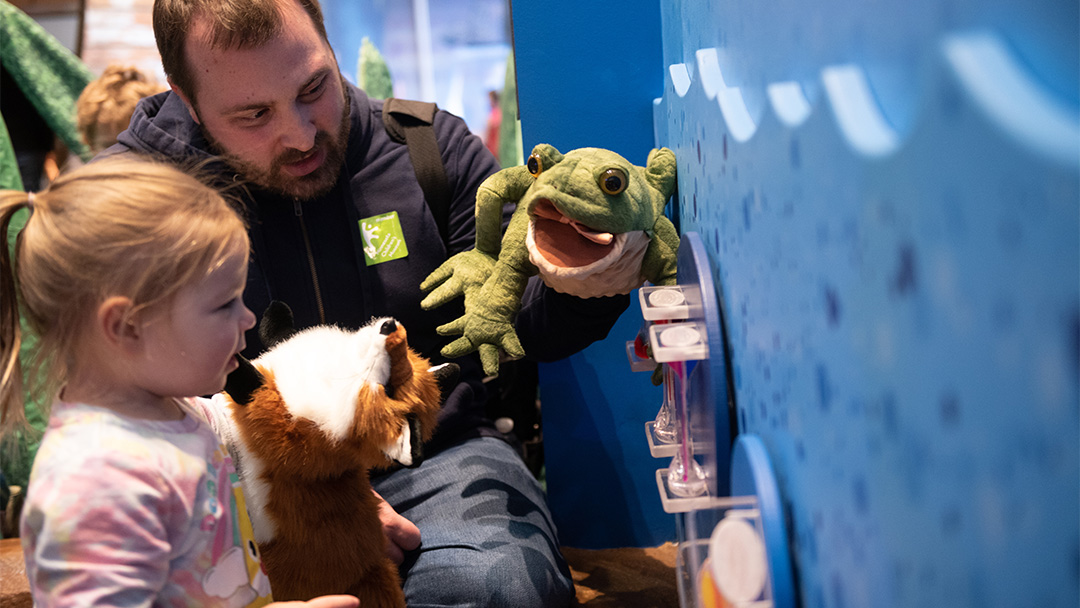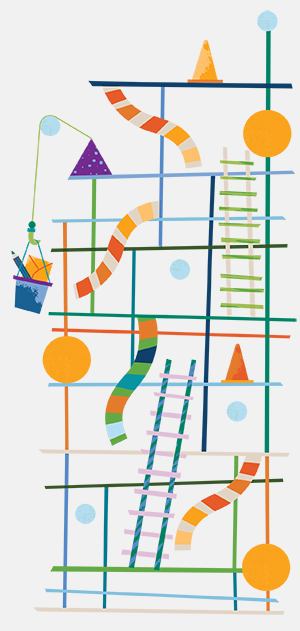
The Power of Open-Ended Questions
You probably ask your child lots of questions every day. But did you know that how you ask your child questions has a big impact? It’s true! By asking open-ended instead of closed-ended questions, you help boost critical and creative thinking, spark communication skills and much more. And, the best part is, it’s easy to do.
Closed vs. Open-Ended Questions
What’s the difference between a closed-ended and an open-ended question? Closed-ended questions are answered in one or two words, and often prompt a yes/no response or a right/wrong answer. “Do you like apples?” or “What color crayon are you using?” for example.
Open-ended questions encourage a child to think deeper and communicate more. “What do you like about apples?” or “Why did you choose that color?”
This is not to say you should eliminate closed-ended questions entirely. Closed-ended questions are necessary to get through the day. For example, “Do you want a hot dog or grilled cheese for lunch?” But, whenever possible – during playtime and in conversation with your child – be intentional about using open-ended questions.
Asking open-ended questions is a simple and powerful way to learn more about your child’s thoughts, theories and interests, and further your child’s development (and yours, as you master the art of asking open-ended questions).
Include Open-Ended Questions in Play Time
Play time is a great time to ask open-ended questions. Here are a few examples to get you started:
- “What do you want to explore first?”
- “What is your plan?”
- “What do you think we should try next ?”
- “How do you think this thing works?”
- “I wonder what will happen when you…”
- “How do you feel about it?”
- “What do you like about this?”
- “Why do you think that happened?”
- “What does this remind you of? And why?”
- “If you could do it over again, what would you do?”
After You Ask a Question … WAIT!
Once you’ve posed an open-ended question, it’s important to give your child the time they need to think about the question and develop their response. By waiting, you’re letting them know you’re looking for their thoughts and ideas, not a specific answer.
4 Benefits of Open-Ended Questions
There are many benefits of open-ended questions. For example, asking open-ended questions boosts:
Critical Thinking. Since there isn’t a right or wrong answer, your child is given the opportunity to think through many different angles and possibilities, and solve problems themselves.
Creative Thinking. Your child has the freedom to think beyond the obvious and tap into their imagination.
Communication. Since answers require more than a one-word response, your child has the opportunity to practice and stretch their vocabulary and communication skills.
Confidence. Open-ended questions empower children to express themselves, which builds self-confidence in sharing their thoughts and ideas with you and others.

SUPPORTING A CHILD’S PLAY
SUPPORTING A CHILD’S PLAY
Playful Mindset Turns Chore Time into Play TIme
There’s no way around it: There are always chores to do and errands to run.
Those responsibilities don’t have to be a drag on an otherwise lovely day. What if, instead, they became a way to engage with kids and have some playful time together?
Tips for Tackling the Boredom Blahs
Kids are hard-wired to play. But even for children, the free and imaginative play that research shows is best for their development doesn’t always come easily. Sometimes their energy levels are low, daily frustrations are too high or they just can’t seem to find the inspiration to create their own fun. That’s when the dreaded “I’m bored” comes out.
Three Tips to Get the Most Out of Screen Time for Kids
Study after study shows that engaging with technology alongside your child helps them get the most out of it.
Helping Kids Manage Stress
While we can’t keep kids from feeling stressed, we can play a crucial role in helping kids feel safe and secure during stressful times.